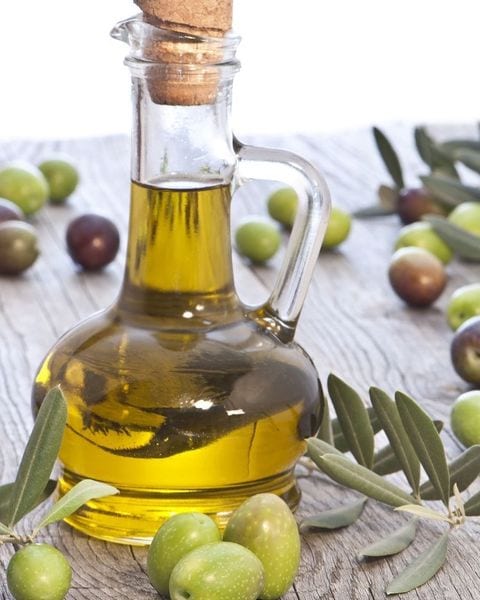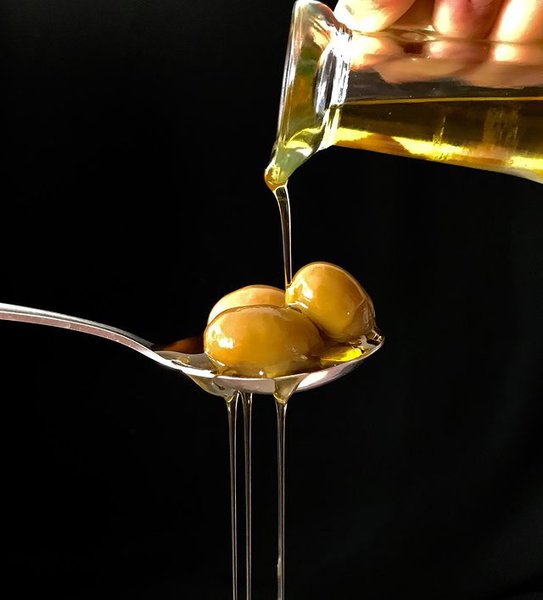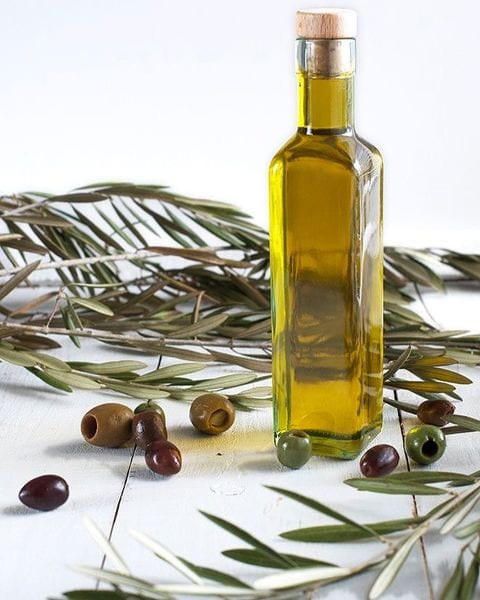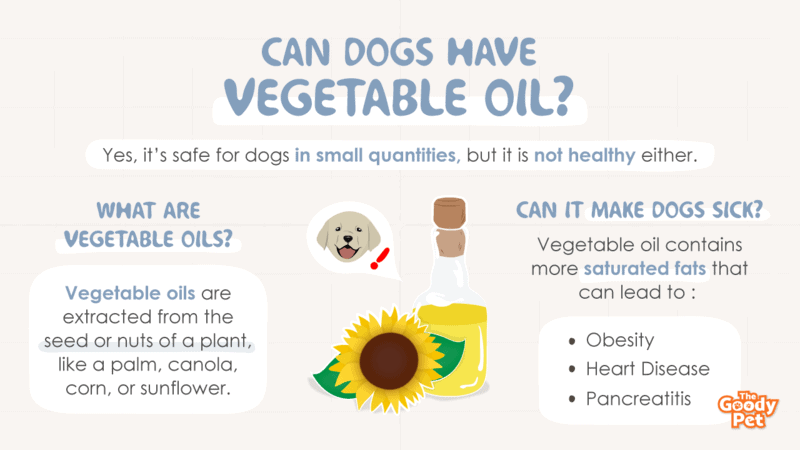When we prepare food in the kitchen, it is not uncommon to have that accidental spill now and then. I had one some time ago when I toppled over a bottle of vegetable oil, and my dear Fido was there, ready and alert to lick anything that dropped its way. Is that okay? Are vegetable oils safe for your dog?
Yes, vegetable oil is safe for your dog but only in small quantities. We all know the health consequences of consuming excessive fats. And vegetable oils, although being plant-based, will pose a health risk such as pancreatitis if taken regularly.
Vegetable oils are oils extracted from the seed or nuts of a plant, like a palm, canola, corn, or sunflower. In the United States, 85% of vegetable oils available in the market are derived from soybeans. It is mainly used as cooking oil for frying or as a substitute for butter in baking.
In this article, we will discuss the effects of vegetable oil on your dog’s health and some alternatives you can add to its diet.
Can Dogs Have Vegetable Oil?

Yes, small amounts of vegetable oil would not cause harm to your dog or be considered toxic, but it is not healthy either.
While our dogs require fats to fuel their muscle and overall general health, vegetable oil is not a great high-quality option since it contains more saturated fats.
When taken regularly, vegetable oil can lead to obesity, heart disease, and pancreatitis. And, if accidentally ingested in large amounts would cause vomiting, diarrhea, and stomach aches.
What Are Vegetable Oils?
Most vegetable oil in the market comes from soybeans or in combination or a mixture of other plant-based oils like corn, canola, cottonseed, safflower, sunflower, and palm.
We will refer to the term ‘vegetable oil’ as oils that we use for cooking, baking, or frying that are light-colored, flavorless, and odorless. Vegetable oils are refined and processed to have a clean and neutral taste that does not interfere with other flavors in the foods we cook.
So, olive, avocado, walnut, sesame, or hazelnut oils are not covered in this topic, although they are technically vegetable oils. Manufacturers use the umbrella term ‘vegetable’ to avoid confusion in labeling.
Can Vegetable Oil Make Dogs Sick?

Yes, if the vegetable oil ingested is used or heated. It’s because heat degrades the oil, and the fats in the oil turn into trans fatty acids or trans fats.
Trans fats are notorious for increasing the risk for heart disease, and every time you reuse the oil, the release of trans fats and radicals increases much more.
Used or overheated vegetable oils, such as the one you have cooked your french fries or fried chicken with, have undergone several chemical processes for it to be unhealthy for dogs. Thus, just go easy and do not go overboard with vegetable oil.
Additionally, foods that are considered toxic to dogs, like garlic and onions, can add the toxicity of the oil that has been used for cooking them.
At the end of the day, we highly recommend that you avoid giving your dog anything fried. More so, if you will fry its food in reused vegetable oil.
What Do I Do If My Dog Ingested Too Much Vegetable Oil?
If your dog has taken lots of vegetable oil, bring it to the veterinarian for a checkup. A drug may be administered to help it induce vomiting to limit the effects of the oil in the stomach.
Usually, your dog may suffer from slight vomiting and diarrhea, and the discomfort would resolve by itself.
In extreme cases, pancreatitis can develop when the pancreas gets inflamed or irritated. If there is nausea, constant vomiting, severe diarrhea, abdominal swelling, and fever, immediately bring your dog to the veterinarian.

What Are Healthier Alternatives For Vegetable Oil For Dogs?
Some dog owners add vegetable oil to their dog’s food as a way to promote healthier skin and coat or act as a laxative to aid in softening their stools if they are suffering from constipation.
As a healthier alternative, you can try using other plant-based oils like olive oil, coconut oil, or flaxseed oil. These oils have more minerals and vitamins than your regular vegetable oil.
Olive Oil
Olive oil, especially extra-virgin olive oil, contains vitamin E, phytonutrients, and omega-3 fatty acids that moisturize dogs’ skin.
Vitamin E also helps in oxidizing free radicals in the body, thereby protecting dogs from cardiovascular disease and cognitive decline.

Coconut Oil
Aside from promoting healthy skin and coat, coconut oil increases the energy level of your dog and minimizes some allergic reactions.
It is rich in medium-chain triglycerides that get broken down faster than longer-chained fats, getting straight into the liver to be converted as energy.
Flaxseed Oil
This type of oil has anti-inflammatory properties that improve cardiovascular function and kidney function.
When adding these oils or vegetable oil to your dog’s diet, be sure to seek the advice of your veterinarian first. A common dose of these oils usually is one teaspoon for a small dog and one tablespoon weekly for a larger dog or according to your veterinarian’s recommendation.





